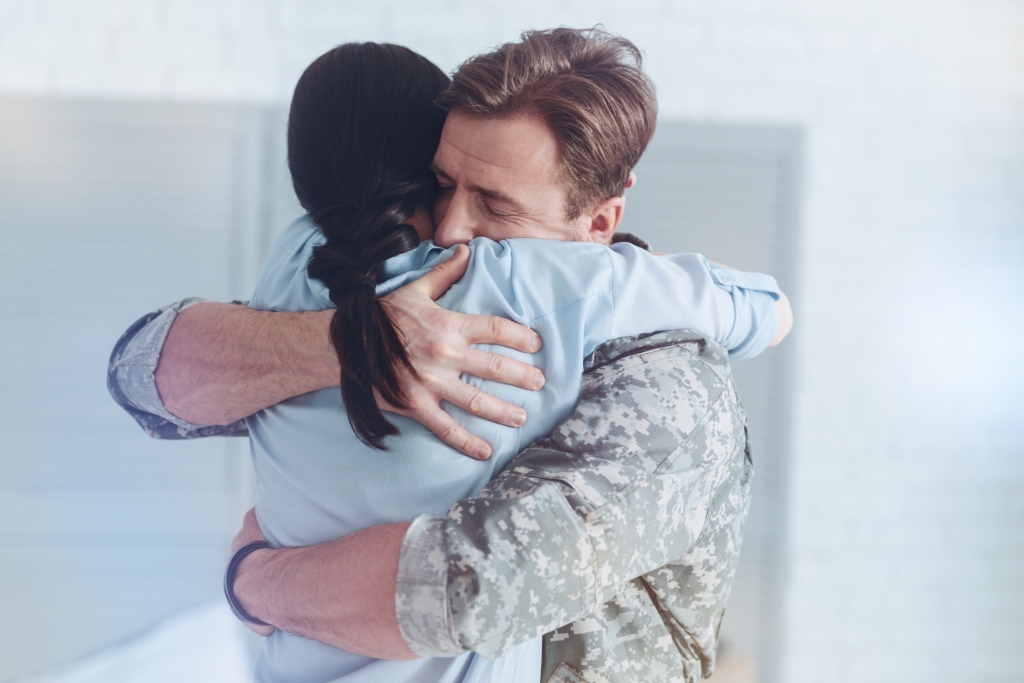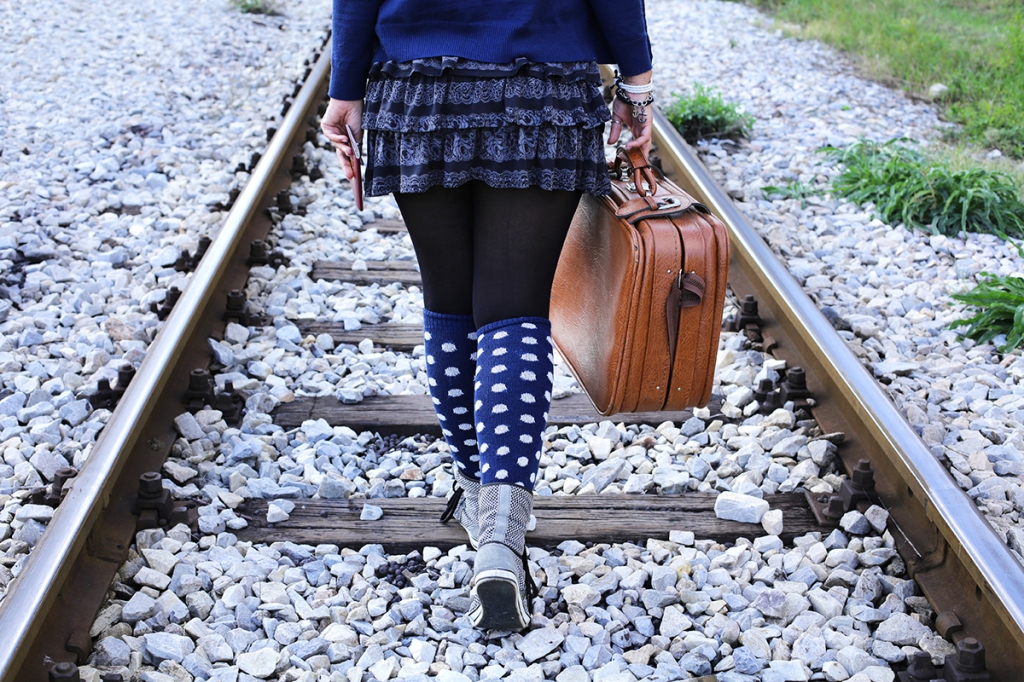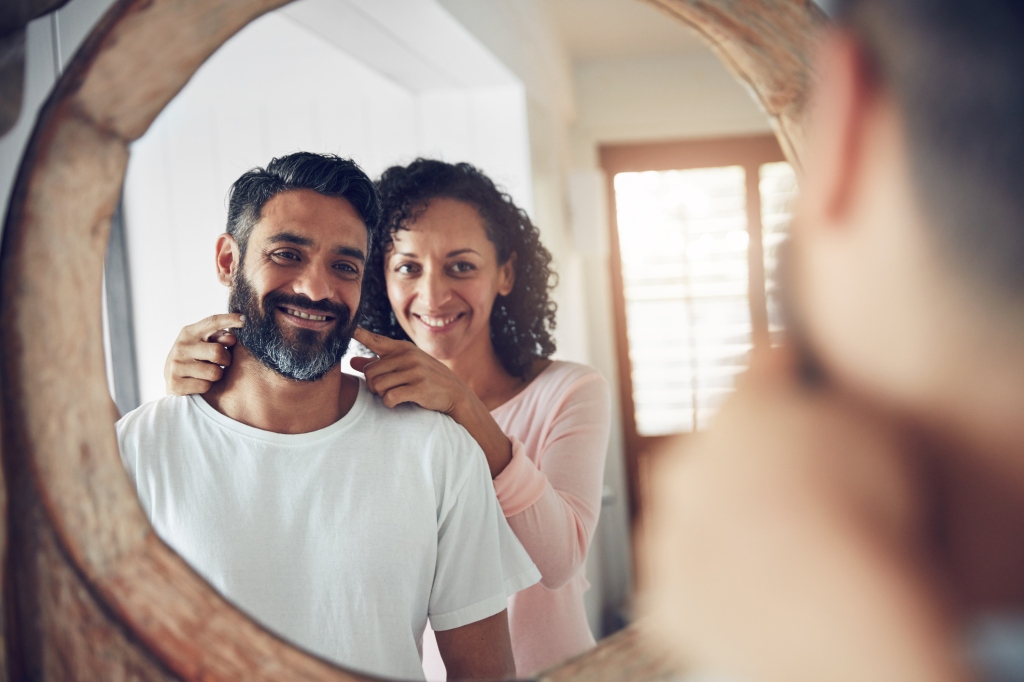“I had no idea that I was missing anything more than I already knew of. I did not know something beautiful existed that I never personally experienced. How can a deaf person comprehend what he is missing when he has never heard the sound of music?”
Unlike the infant, the adult is able to fulfill all but one of his biological needs himself. He needs no one else to help him eat or drink, urinate or defecate, keep himself warmer or cooler. The adult can even fulfill his own sexual needs. There is only one biologic need for which the adult is dependent upon someone else; the need for bonding. Of course, the adult does not need to be bonded for as long a time as the infant, but then again, he does not have to eat as often as the infant.
Just as there is a difference between infantile food and adult food, there is a difference between infantile bonding and adult bonding. The infant bonds by being held in an emotionally open warm loving embrace. His activity is in mouth (or breast) and eye to eye contact. If you meet people who cannot look you in the eye, you now know where it comes from. When people work this problem through in my groups, they no longer feel guilty, anxious, or generally uncomfortable looking anyone in the eye. They finally feel good enough and entitled.
The child bonds in still another way. He holds on with his hands and arms. It is amazing to see people whose hands and arms shake with terror when asked to hug someone. One ex parachutist who is not afraid to jump out of planes told me that when he heard me tell him to actively hold on and hug someone, he felt I was asking him to jump out of an airplane without a parachute. He could not do it by himself the first time. After his arms and hands were firmly pressed into someone’s back, in a hug, a few times, he did overcome his phobic terror. What was his terror about? Simple. As a child, he never had anyone to hold on to or hug, or be hugged by. He still could not believe even at that moment. His beliefs, emerging from his honest feelings conditioned over a lifetime, could not accept that there would be someone there for him. He felt it would be such a torture that it would kill him if he tried and found out he was right. He literally would prefer jumping out of an airplane without a parachute. At least there he knows how it would feel and exactly what to expect.
Adults bond by holding each other in a warm bear hug, bellybutton to bellybutton, pelvis to pelvis. Believe me, that brings up a lot of feelings and thoughts of one’s past. My process deals with these feelings and thoughts, one by one. The technique really works.
I let people working in my process know that if sexual thoughts, connotations, or sensations emerge, think to yourself that you are not going to be intimidated, settle or be distracted by sex. Do not use sex as a defense not to bond. Do not use sex as a substitute to bonding. People would more easily trust others with their genitals than their heart. It is a very poor substitute.
As adults, feelings and attitudes that we have experienced historically in association with all our needs are transferred to the one need we adults still have for other people. If the total spectrum of the infant’s and child’s biological needs was not quantitatively and qualitatively met, the emerging adult will not trust people with her/his last residual need for others, the need for bonding. We become phobic, paranoid, and inhibited about the fulfillment of a basic need required for happy survival. Bonding becomes the reservoir of all the emotional feelings, and emotionally laden thoughts (attitudes), we have experienced in association with the fulfillment or non-fulfillment of all our other biological needs since birth. This paragraph is extremely important. Please make sure you understand it.
Let me give you an example.
When I was a child I had terrible fights with my mother over food. She was a hard-working businesswoman who had little time, patience, or energy left over at the end of a working day to make supper for her family. If I were hungry before supper was ready she told me to shut up and wait. She only had two hands. I should feel lucky I had something to eat, people were starving all over the world. I felt guilty I was hungry when supper was not ready. If I were not hungry when supper was ready, that was too bad. I had to eat it anyway. What do I think “a mother is, a slave?” My mother did not have the time to wait for me to get hungry.
In reality, she had too much to do. But I always thought it was my fault. In addition, the rest of the family was prepared to eat. “What is wrong with you?” I did not know, but I figured there must be something wrong. I thought defective, bad, and guilty. I learned to shut up and not express what I was thinking or feeling. To resolve the pain and depression, although I took a violin lessons, I sat down at the piano and played by ear on the piano whatever I was feeling. I learned to eat the food boiling hot even though I burnt my mouth, because I heard her say over and over again, “hurry up and eat it before it gets cold and rotten.” I feared that it would turn to poison. I also had to eat ice cold food before it got warm because that too would to a rotten decaying poison. I recall eating boiling oil that she called chicken soup with a glass of cold water. I drank the water first then the oil. I became, by conditioning, the fastest eater I ever met. I was the only intern in the hospital who finished every meal before he was called for an emergency. I guess my symptoms were not all self-defeating. I never had any gastrointestinal problems.
My natural taste for food must have evolved and come from a different planet from my mother’s. Everything I loved was poison for me…ice cream, cookies, chocolate, candy. Everything I hated, spinach and oatmeal, I had to have, one or the other, every day.
Perhaps you do not know how inadequately washed spinach served by a busy, tired cook tasted. It tasted like eating the sand on the beach (which was only four blocks away). People tell me oatmeal does not taste the way I describe it from my memory of 50 years ago. Really no taste. Just cold and dry on the inside and burning hot and gooey on the outside. If I wanted more food then she had prepared, I was told to shut up and be thankful I had something to eat. If I did not want to eat everything that was on my plate, then I would be personally responsible for eight million Chinese starving that very night.
To make matters worse, I was naturally left-handed. I was taught (forced) to learn to write and eat with my right hand. I can remember my mother telling me that no civilized person would eat with me if I did not put the food in my mouth with my right hand. It seemed to me we always had peas as a vegetable. I remember my mother yelling at me to get off the floor under the kitchen table and sit on the chair at the table. “Why did you leave your seat and go under the table,” she would ask in a controlled, exasperated tone. I would answer apologetically that I just wanted to get the peas that rolled off my fork on the way to my mouth. I was just sitting on the floor sticking the peas onto the fork so that they would not roll off.
When I first went to Europe, the first thing I thought when I ate with my European friends, was, “Good lord, they are not civilized.” They would never make it with my mother. They all put the food in their mouth with their fork held in their left hand! What was worse, the fork was frequently turned upside down! I took the opportunity to feel what it felt like to finally feel the freedom of eating with my left hand. I could do it, but it was now too late. It was easier to eat with my right hand.
No wonder I was happy to make my own breakfast when I was seven. A glass of milk, two raw eggs, cookies or crackers, and an orange or apple on the way to school. As I grew up and took responsibility for my own food intake, I did not think about the tension and outright fights I’d had with my mother over eating food.
However, when I became a teenager and wanted to be close to a girl all the old tense feelings that I had over supper came up. As I write this, I think I must have felt the same way as an infant when I gave up her breast. It strongly feels the same to me. I cannot intellectually remember anything about sucking her breast but the thought – feeling is revulsion. I can actually still feel the desire to push away. But I have no conscious verbalizable thoughts.
I did not understand or question the feelings I had when I was a teenager. I did not understand that it was the same feelings I had with my mother. I did not realize that I unconsciously assumed that the same frustrations, pains, fears, resentments, and guilts in getting the love I wanted from a girl would be the same as I experienced in getting the food (and love) I wanted from my mother.
I just assumed that “this” is the way I am. Deep inside I did not feel good enough or lovable, but I did not think in those words. I felt so uncomfortable, that I chose to go out with girls to whom I was not that attracted. When I somehow managed, usually through peer pressure, to go out with a girl I secretly liked, I acted as if I were bored and did not like her. For 10 more years I felt and acted that way. I avoided and would not volunteer to date women to whom I was really attracted. By the time I was in my second year of medical school, I felt good enough about myself to start to go out with women I really liked. But I was still too uncomfortable to enjoy them naturally and with ease. It is hard to enjoy love with a gun of fear pointed at one’s head. Even at my most openness I held back. But I did not know it except in retrospect long afterward.
I did not know it at the time, but I transferred all the feeling and attitudes I had about my mother and myself onto the women I liked and wanted to love. It was not that I thought they were my mother. They were too young and thin and physically attractive to me for me to think they were my mother. After all I’m not crazy. It is just that unconsciously (that is without consciously thinking about it) I felt that they would not only not give me what I wanted, but they would make me feel guilty, ashamed, and inadequate for asking. I unconsciously decided I did not want to pay a large price in painful humiliation and not get anything anyway.
I was what I call a rejecter. I rejected even the potential of a loving human relationship no matter what price I would have to pay in deprivation, isolation, emptiness, loneliness, and unfulfillness. Having never experienced from a woman enough pleasure to risk the pain of humiliation and loss of self-esteem and personal freedom, I did not know emotionally the real potential pleasure that existed. Had I continued with my defenses, I would have never found out. I had no idea that I was missing anything more than I already knew of. I did not know something beautiful existed that I never personally experienced. How can a deaf person comprehend what he is missing when he has never heard the sound of music?
Most people are phobic (frightened) or paranoid (angry) about bonding. They will act out their feelings in one of four ways. Most people are not as extreme in their behavior as Harlow’s monkeys (our delinquent’s adolescents frequently are). However, people will assume one of the four options for their potential behavior which stems from two emotions. The emotion of fear gives rise to the behavior of flight or withdrawal. The emotion of anger gives rise to the behavior of fight or control.




Leave a comment